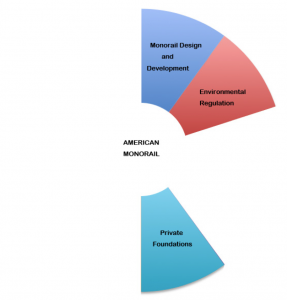 Alternative and New Systems Technology
Alternative and New Systems Technology
Cooperation with environmental regulatory authorities and private technology research and development foundations can promote refinement of monorail system technology and performance to directly and specifically address environmental issues to a level and extent that monorail system development may become virtually exempt from the environmental rigors and restrictions that impinge upon all transportation-related development in the United States. Monorail vehicles and propulsion systems can be demonstrated to be the most efficient, least polluting and most environmentally sound of any type of transportation. Combined with the high levels of efficiency and sustainability, monorails are potentially the standard to which other transportation systems can be compared and measured.
An unprecedented level of cooperation in drafting of environmental performance standards may be achieved through the combined efforts of monorail system designers, manufactures and environmental authorities charged with regulating impacts and implementing environmental performance standards throughout the transportation industry. Private foundations can underwrite research and analytical study of the strategic and technological advantages monorails hold over all other forms of mass transportation. It is entirely possible that monorail systems may become the preferred alternative, and standard by which a wide range of mass transportation development proposals are evaluated regarding environmental and financial, as well as, other aspects of performance and service. Private foundations can bring fuel cell manufacturers, environmental authorities and the monorail industry into mutually beneficial efforts to incorporate fuel cell technology into state of the art monorail systems.
Monorail manufacturers and developers can present comparative cost and performance analyses for any proposed transportation development, condition or transportation environment. The most effective application and consideration of monorails’ potentials are in the initial, or pre-planning stages of transportation system design and implementation. Post construction, or retroactive critiquing of systems already in service will be of minimal use to the completed systems, and their respective communities, but may provide valuable direction to evaluation and planning of future mass transportation systems. This underscores the strategic importance and necessity for revision of the funding and evaluation criteria by which federal transportation authorities and agencies approve and finance development of transportation systems throughout the United States. A timely review and critique of transportation developments such as California’s high-speed rail project, Los Angeles County Metropolitan Transportation Authority’s subway and rail system expansion, and other mass transit projects, should bring realistic scrutiny onto the cost-effectiveness and viability of the projects relative to monorail alternatives.
Fully operational and competitive monorail designers and manufacturing companies should be invited to present their successful international projects, plans and development contracts for future monorail systems to an American public that is uninformed of the scope of monorail development and services throughout the world. The general American public, as well as, local governments, taxpayers and regional transportation authorities are generally unaware of the scope and size of established North American monorail industry that has manufactured and developed several monorail systems in the US, and is well under way with plans to build monorail systems in Brazil, Saudi Arabia and other international venues. The success of Bombardier, of Ontario, Canada, has led to the substantial expansion of its Millhaven production and testing facilities to meet international demand for their most advanced monorail systems, while Scomi Rail Corporation has built and operated a modern monorail system in Kuala Lumpur, Malaysia since 2004, with an outstanding 99 percent on-time reliability in transporting over 100,000,000 passengers throughout the urban core of the city.
In perhaps the most far reaching developments in monorail technology, the independent, on board monorail propulsion systems developed by Metrail, of Frazer-Nash, UK, pose the most comprehensive and effective solutions to the ever-increasing environmental regulatory performance criteria facing all forms of transportation and urban development, at virtually every level, scale and venue throughout the United States.
Educational information presented from the perspective of successful monorail builders and manufacturers, environmental authorities and private foundations supporting the modern and practical transportation solutions that monorails represent should bring monorail systems into the forefront of transportation planning and decision-making. And, these discussions and educational programs can be organized and presented to public groups and governing bodies at all levels; from city halls to neighborhood associations, schools to regional transportation authorities, and state legislatures to federal transportation agencies.




